No products in the cart.
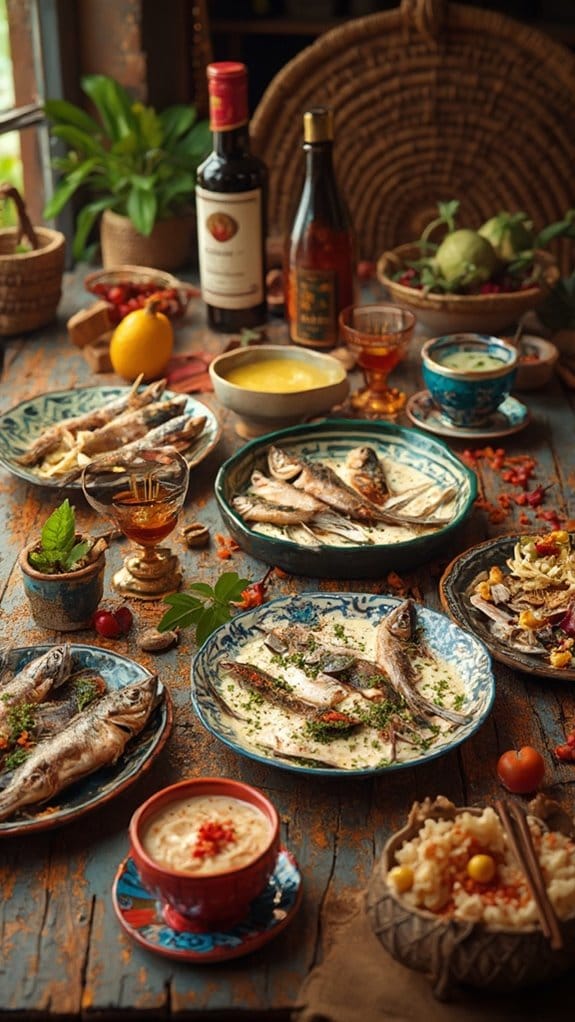
Exploring the Tradition of Eating Fish for Prosperity in Various Cultures
Eating fish is more than a culinary delight; it’s a tradition rooted in the belief that fish brings prosperity across various cultures. From China, where “yu” represents abundance during New Year meals, to the sacred salmon of Celtic folklore symbolizing wisdom, fish signifies wealth and good fortune. Ever wonder why pickled herring appears on Scandinavian tables at Christmas? It’s all about celebrating life’s blessings! Plus, fish is packed with nutrients that are great for your health. Intrigued by these customs? There’s so much more to uncover about the fascinating connection between fish and fortune in cultures worldwide!
Contents
hide
Key Takeaways
- Fish symbolizes prosperity and abundance in many cultures, often linked to wealth and fertility during significant celebrations like the New Year.
- In China, the word for fish, “yu,” signifies surplus, making it a staple in festive meals for good fortune.
- Native American traditions celebrate fish as symbols of fertility and motherhood, connecting them to life’s origins and prosperity rituals.
- Scandinavian customs feature pickled or smoked herring during festive occasions, reflecting cultural beliefs in fish as a source of prosperity.
- In Japanese culture, serving fish with long noodles during celebrations symbolizes wishes for longevity and prosperity, reinforcing its cultural significance.
Cultural Significance of Fish

Fish hold a profound cultural significance across various societies, often symbolizing prosperity and life itself. You might be surprised to learn just how deeply embedded fish are in the mythology and rituals of different cultures.
For instance, in ancient Mesopotamia, fish were closely linked to the god Enki, serving as a reminder of the powerful forces at play in the universe. Ever thought about how the salmon in Celtic culture represents wisdom and foresight? By munching on sacred hazel nuts, these fish were believed to reveal secrets of the future. Fish act as a guide in uncertain times, providing spiritual support and insight to those seeking direction. They are also celebrated in various cultural dishes, showcasing their importance in culinary traditions.
Fish mythology doesn’t stop there. In African creation myths, fish are sent into cosmic waters, acting as symbols of life’s origins. Similarly, in Native American traditions, fish rituals—like fish dancing—celebrate prosperity and fertility. You can almost feel the energy when imagining those vibrant ceremonies! Additionally, fish serve as a crucial source of global protein intake, further emphasizing their importance in sustaining life and culture.
Let’s not forget how fish feature in Christian symbolism, representing Christ during tough times. And in Chinese culture, Kwan-yin’s fish depiction embodies compassion and mercy. When you think about it, fish really do connect us all, don’t they?
These diverse fish rituals reveal a rich tapestry of beliefs that demonstrate how fish are more than just a meal—they’re a bridge to understanding life, guidance, and resilience.
Traditional Dishes Across Cultures
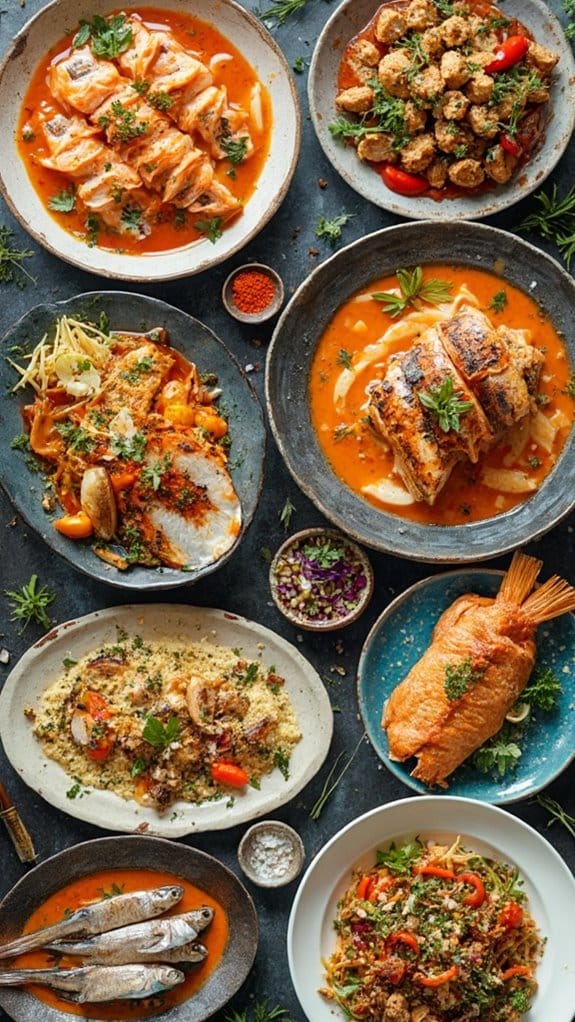
Across the globe, traditional fish dishes reveal the deep-seated connections between culture, celebration, and community. Have you ever wondered how different cultures showcase their love for fish during special occasions?
Take, for example, the Portuguese *Bacalhau da Consoada*, a Christmas Eve staple featuring salted cod, potatoes, and cabbage. This dish not only adheres to Catholic fasting rules but also reflects Portugal’s rich history of exploration and fishing, as it highlights the cultural significance of seafood in Portuguese cuisine.
In Sweden, you might find *Janssons Frestelse*, a creamy potato casserole loaded with anchovies or sprats. This hearty dish warms you up during the winter and beckons friends and family to gather around the holiday table. Interestingly, *Ikan goreng* is a popular dish in Indonesian cuisine, showcasing the preparation method of deep-frying fish.
Similarly, the Italian-American *Feast of the Seven Fishes* serves up a smorgasbord of flavors with unique preparations like *baccalà* and *pasta con le sarde*, all symbolizing rich Catholic traditions.
Traveling to Eastern Europe, pickled herring takes center stage during Christmas Eve suppers. Marinated in a tangy brine, it symbolizes prosperity for the coming year.
Meanwhile, in the Philippines, dishes like *Pancit Malabon* and *Ginataang Isda* showcase seasonal ingredients, featuring fresh seafood and local flavors that celebrate community gatherings.
Whether it’s grilled *Ikan Bakar* in Indonesia or a comforting bowl of Bouillabaisse in France, these traditional fish dishes connect us, reminding us that food is more than just sustenance—it’s a celebration of culture and togetherness.
Isn’t that something to savor?
Nutritional Benefits of Fish
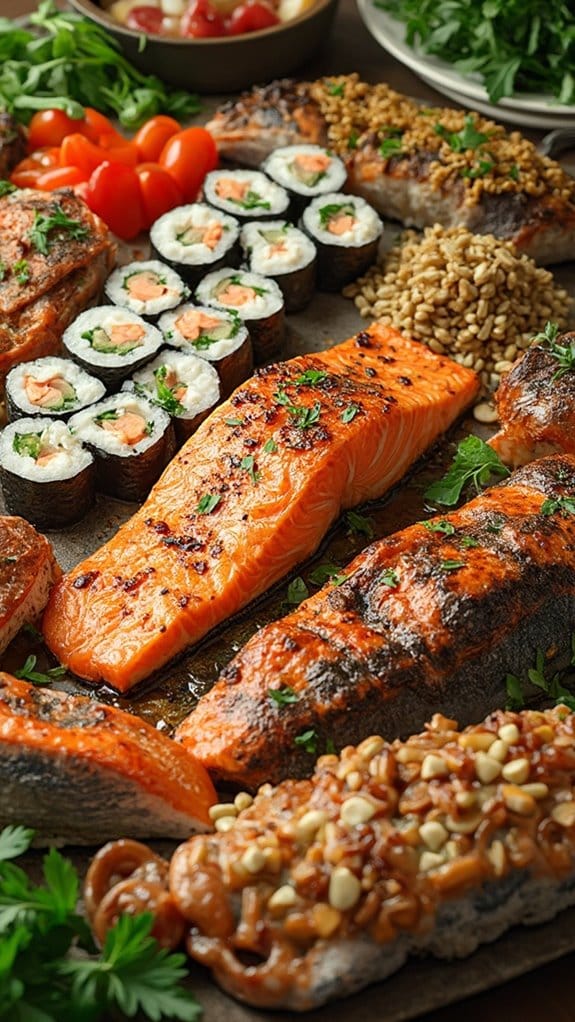
Incorporating fish into your diet offers a wealth of nutritional benefits that can markedly enhance your overall health. You might be surprised to learn that fish is a fantastic source of protein, essential for maintaining strong muscles, healthy organs, and robust blood vessels. Plus, it’s low in “bad” fats, making it a smart choice compared to red meat. With its low calorie content, fish can even support your weight management goals!
But that’s not all—fish is packed with essential vitamins and minerals. You’ll find important B vitamins, vitamin D, and minerals like calcium and iron in your favorite catch. Vitamin B12 is particularly important for your red blood cells and nerve function, while iodine plays a key role in keeping your thyroid happy. Additionally, fish consumption is known to support overall heart health through its rich nutrient profile. Regular intake of omega-3 fatty acids can improve cardiovascular health and reduce the risk of blood clots.
Let’s not forget about omega-3 fatty acids, found abundantly in fish like salmon and mackerel. These powerful nutrients are known for boosting brain health and reducing the risk of heart disease.
Want to keep your heart ticking smoothly and your brain sharp? Regularly enjoying fish can help lower blood pressure and improve cognitive function.
Risks of Fish Consumption

While the nutritional benefits of fish are well-known, it’s essential to be aware of the potential risks that come with consumption. You might be wondering, “What’s the catch?” Unfortunately, fish can harbor harmful contaminants like mercury and PCBs, which can pose serious health threats.
Mercury exposure is particularly concerning, especially for unborn babies, infants, and young children. Their developing nervous systems are at higher risk, and prolonged exposure can lead to symptoms like tingling skin, loss of coordination, or even slurred speech. Some fish, like shark, swordfish, and king mackerel, have higher mercury levels, so it’s wise to be cautious about what you’re choosing for dinner. Eating 1-2 fish meals weekly is recommended for heart health, but it’s crucial to select safe options. Additionally, consuming fish from the best choices category helps minimize exposure to harmful contaminants.
Then there are PCBs, or polychlorinated biphenyls, which can sneak into your meal through contaminated waters. These nasty chemicals can cause a host of issues, including lower birth weights and learning difficulties in babies. They can also affect your immune system, liver, and even your reproductive health.
So, while fish may seem like a great option for a healthy diet, you’ve got to weigh the risks. It’s important to stay informed and follow local fish consumption advisories. If you love fishing or come from a culture that cherishes fish, be mindful of what you’re catching and eating.
Safe Preparation Methods
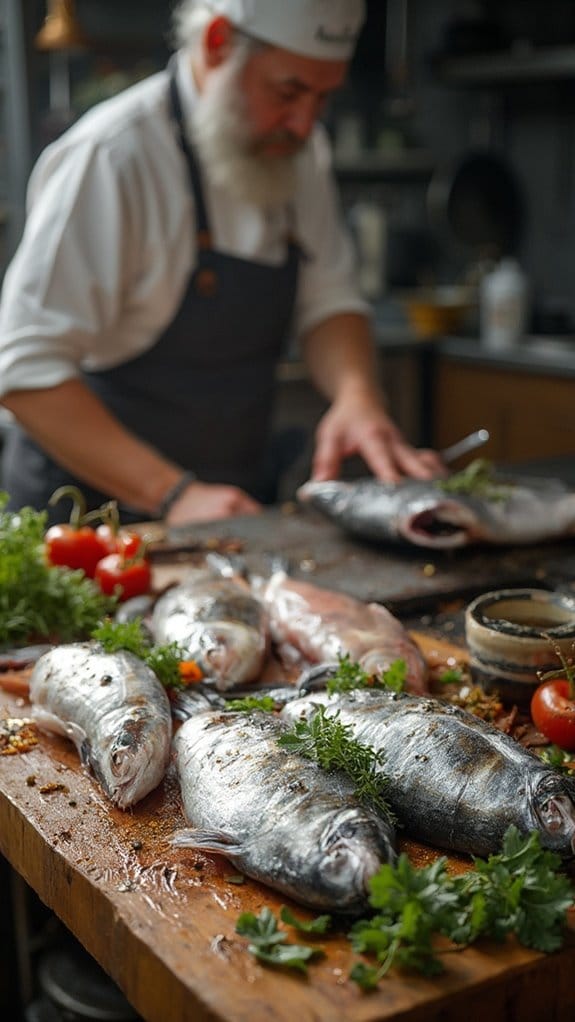
Understanding the risks associated with fish consumption is just the beginning; knowing how to prepare it safely is equally important. If you want to enjoy the benefits of fish without the worry, let’s explore some essential safe handling and cooking techniques.
First things first, always wash your hands with warm, soapy water for at least 20 seconds before and after touching fish. It’s a simple yet effective way to prevent cross-contamination.
Speaking of which, keep raw and cooked fish separate. Use distinct plates and utensils for each to avoid any mishaps. Store your fish in the fridge, ensuring its juices don’t drip onto other foods. And remember, never re-freeze seafood that’s already been thawed—it’s just not worth the risk.
When it comes to cooking, aim for an internal temperature of at least 145 degrees F. A food thermometer is your best friend here! You’ll know it’s done when the flesh flakes easily with a fork and turns opaque. Additionally, fresh fish should be prepared or frozen within 1-2 days of purchase to ensure safety and quality. Eating fish regularly has been linked to improved brain function and mental health, making it even more important to handle it safely.
Got a favorite cooking technique? Grilling, pan-searing, and poaching are all fantastic options. Just be sure to handle everything in a clean area, keeping your preparation space tidy.
Global Fish Consumption Practices

Fish consumption practices vary widely across the globe, reflecting diverse cultural, economic, and geographical influences. Did you know that by 2031, global fish consumption is expected to reach about 21.4 kg per person? That’s an increase from 20.5 kg in recent years! While the growth rate is slowing, fish is still outpacing meat consumption, making it a staple in many diets.
Here’s a quick look at some key consumption trends:
| Region | Per Capita Consumption (kg) |
|---|---|
| Asia | 76% of additional fish by 2031 |
| Africa | Declining from 10.0 to 9.9 kg |
| High-Income Countries | Average 30.2 kg |
In Asia, especially China, fish holds a significant place on the table, accounting for 37% of total food fish consumption. Meanwhile, affluent countries enjoy higher consumption rates compared to low-income regions. The economic factors, including sustainable fishing practices and vibrant fish markets, play an essential role in this dynamic.
But why do some communities thrive on fish, while others see a decline? Cultural traditions, seasonality, and socio-economic conditions shape these habits. For instance, in Native American and Asian-American communities, fish isn’t just a meal; it’s a part of their heritage. So, next time you’re at the fish market, consider how your choices support not just your dinner plate but also the livelihoods and cultures around the world. Isn’t that a thought worth savoring?
Fish in New Year’s Celebrations
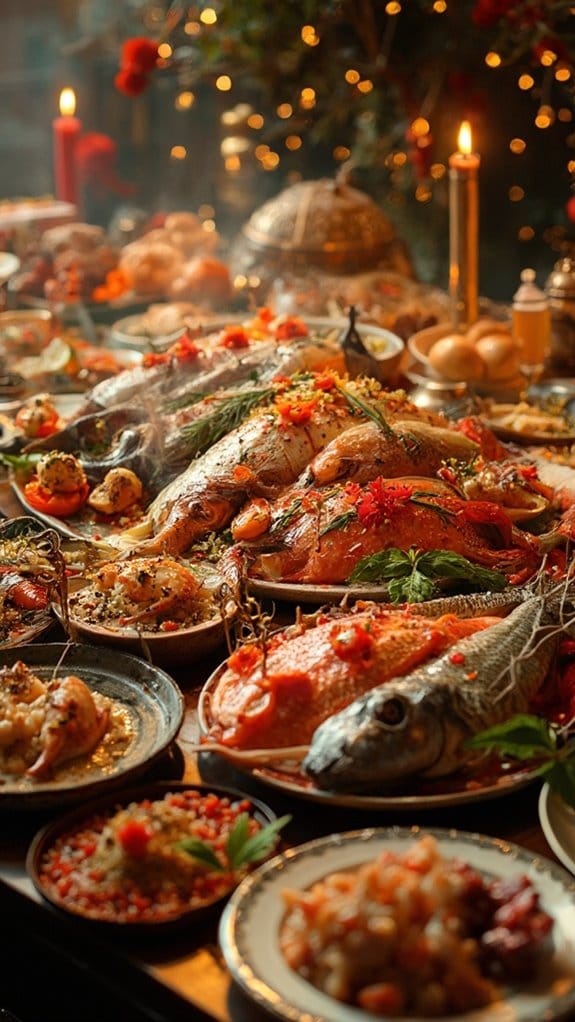
Celebrations around the world often feature fish as a symbol of prosperity and good fortune during New Year’s festivities. Have you ever wondered why fish is such a big deal when ringing in the new year? In cultures like China, the word for fish, “yu,” means surplus or fortune, making it a must-have dish during the New Year celebrations.
You might find whole fish served with the head and tail intact, a nod to the continuity of life and the year ahead.
In Scandinavian countries, herring takes the spotlight, often pickled or smoked, symbolizing good fortune and wealth. How cool is that?
And in Japan, families enjoy fish alongside long noodles to wish for longevity. You’ll find varieties like salmon, mackerel, and carp on the table, each bringing its own twist to the celebration.
As for cooking methods, the way fish is prepared can vary widely. In Southern China, for example, they often steam perch to keep its fresh flavor intact.
But don’t be surprised if you see some folks leaving the head and tail for the next day, symbolizing abundance and surplus.
Symbolism of Fish in Traditions

Many cultures around the world associate fish with deep symbolic meanings tied to prosperity and fortune. Ever wondered why fish appear in so many traditions? From Native American tribes to Asian cultures, fish myths abound, illustrating their importance in our lives.
For instance, in Native American cultures, fish symbolize not just sustenance but also fertility and motherhood. Many tribes, like the Iroquois, celebrate fish through rituals and totem poles, recognizing their role as wise shapeshifters of the water, embodying the mysteries of nature.
In Asian cultures, fish take on an even broader significance. The Chinese character “yu” sounds like “abundance,” making fish a powerful symbol of wealth. Koi fish, with their ability to swim upstream, represent courage and perseverance, qualities we all admire. They also symbolize devotion and longevity—traits that make life richer and more fulfilling.
Meanwhile, in Celtic traditions, fish like the salmon represent wisdom and insight. These creatures not only nourish but also guide us toward deeper understanding, connecting us to the mysteries of our existence.
Regional Variations in Fish Dishes
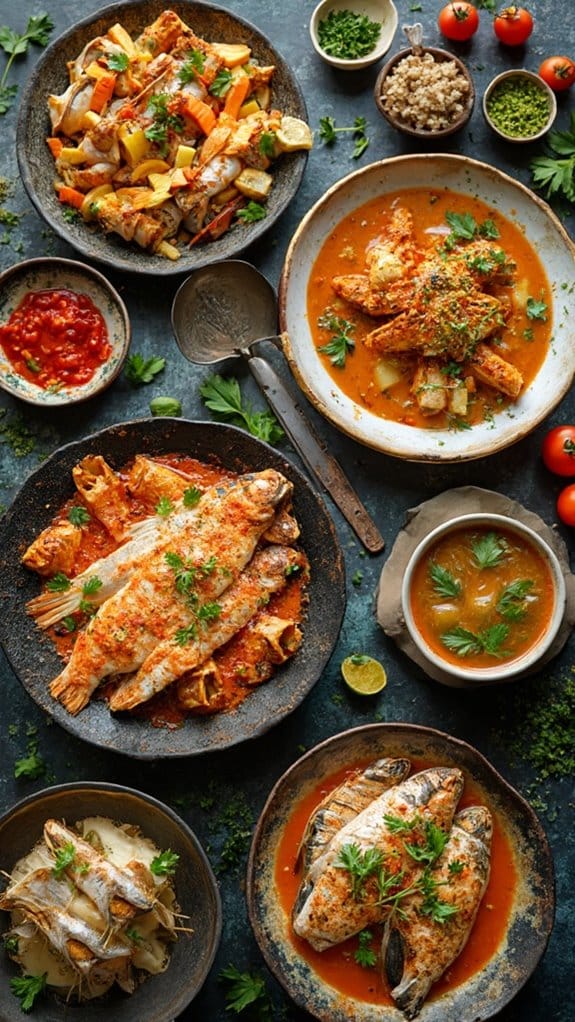
Culinary diversity thrives in the myriad ways fish is prepared and served across cultures. Have you ever noticed how regional preferences shape the fish dishes people enjoy? In China, for instance, you’ll find that northern folks love their carp in a rich soy sauce stew, while those in the south prefer steamed perch that highlights its fresh flavor. Isn’t it fascinating how something as simple as a fish can reflect local tastes?
In Qingdao, Shandong province, dumplings stuffed with mackerel, leek, and pork are a cherished tradition. Imagine gathering around a table for a big ‘basin meal’ where shrimp, scallops, and various fish mingle in one hearty stew—what a feast! It’s all about sharing good fortune, especially when that large yellow croaker arrives, its scales symbolizing wealth.
Then there’s the Italian-American tradition of the Feast of the Seven Fishes on Christmas Eve. Each region brings its own flair, from the minestra di pesce in Rome to malloreddus in Sardinia. Isn’t it intriguing how cultural influences intertwine through fish preparations?
No matter where you are, the way fish is served—whole and intact, with the head facing the guest of honor—adds an extra layer of meaning to your meal. Fish isn’t just food; it’s a celebration of tradition, family, and, of course, good fortune.
Frequently Asked Questions
How Do Different Cultures Prepare Fish for New Year’s Celebrations?
When you think about how different cultures prepare fish for New Year’s celebrations, it’s fascinating!
Some steam or stew fish, adding sauce variations like soy or spicy marinades to enhance flavor. Others grill or smoke it, creating a delicious char.
Ever tried whole fish served with the head facing you? It’s a sign of respect!
With so many cooking techniques and styles, there’s always something new to discover and enjoy.
What’s your favorite way to celebrate?
What Types of Fish Are Considered Lucky in Various Cultures?
Isn’t it ironic how a simple fish can bring such luck?
In many cultures, certain fish hold deep cultural significance. For instance, in Chinese culture, carp symbolize wealth and prosperity, while in Japan, koi fish represent luck and perseverance.
Even the humble goldfish in Feng Shui is believed to attract good fortune.
Are There Vegetarian Alternatives to Fish for Prosperity Traditions?
You can find plenty of vegetarian substitutes that fit right into prosperity traditions.
Think about using tofu or jackfruit to create delicious fish-like dishes. Algae offers a unique ocean flavor too, making it perfect for soups or sushi.
Plus, you can adapt traditional recipes to include these alternatives, showcasing cultural variations while enjoying a plant-based feast.
How Can Fish Consumption Impact Local Fishing Communities?
You mightn’t realize it, but your fish consumption can really boost local fishing communities.
When you support sustainable fishing, you’re helping protect fish stocks and ensuring community livelihoods thrive.
Imagine the families relying on fishing for their income!
By choosing responsibly sourced seafood, you’re not just enjoying a meal; you’re also strengthening the economic backbone of these communities.
Isn’t it great to think your choices can make such a difference?
What Are the Environmental Concerns Related to Fish Consumption?
When you think about fish consumption, have you considered its impact on our oceans? Unsustainable fishing practices threaten ocean health, leading to overfishing and habitat destruction.
Bycatch harms marine biodiversity, while pollution from fish farms can create dead zones.
So, how can you enjoy fish while protecting the environment? Supporting sustainable fishing guarantees that future generations can also savor the ocean’s bounty.
It’s a win-win for you and our planet!
Conclusion
So, the next time you sit down to enjoy a delicious fish dish, think about the rich traditions and cultures that celebrate this symbol of prosperity. Whether it’s a crispy fried fillet or a steaming bowl of fish stew, each bite connects you to a world of customs and beliefs. Isn’t it amazing how something so simple can carry such depth? As you savor your meal, remember, you’re not just eating—you’re partaking in a timeless ritual of hope and abundance!

